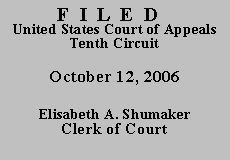

| JEFFREY LYLE PROPHET, |
|
| v. | |
| TONY CAROCHI, Warden, and ATTORNEY GENERAL OF THE STATE OF COLORADO, |
I. Background
Prophet's § 2254 petition arises out of his 2000 Colorado conviction for second-degree murder and second-degree assault, for which he received two consecutive prison terms for 48 and 12 years, respectively. The Colorado Court of Appeals affirmed the convictions and sentence on direct appeal, and the Colorado Supreme Court denied his petition for a writ of certiorari. Subsequently, Prophet filed post-conviction motions in the Colorado trial court. The trial court denied his motions, and the Colorado Court of Appeals affirmed those rulings. The Colorado Supreme Court then denied Prophet's petition for a writ of certiorari in the post-conviction proceedings.
In this § 2254 action, Prophet raised the following claims: (1) his guilty plea was not knowing and voluntary, in violation of his federal constitutional right to due process, because he was under the influence of the sleep aid Restoril when he entered the plea; (2) trial counsel provided ineffective assistance of counsel in violation of the Sixth Amendment by allowing him to enter the plea while under the influence of Restoril; (3) trial counsel provided ineffective assistance by failing to investigate or advise him on the heat of passion defense. The magistrate judge concluded claims one and two were meritless and claim three was procedurally barred because Prophet failed to raise it before the trial court as required by state law. With respect to claim three, moreover, the magistrate judge found Prophet had failed to satisfy either the cause and prejudice or fundamental miscarriage of justice exceptions to the procedural bar. Upon de novo review, the district court adopted the magistrate judge's recommendation and dismissed the petition.
To appeal the district court's denial of his § 2254 petition, Prophet must obtain a COA by making "a substantial showing of the denial of a constitutional right." 28 U.S.C. § 2253(c)(2). He may make this showing by demonstrating that "reasonable jurists would find the district court's assessment of the constitutional claims debatable or wrong." Miller-El v. Cockrell, 537 U.S. 322, 338 (2003). "[A] claim can be debatable even though every jurist of reason might agree, after the COA has been granted and the case has received full consideration, that [the] petitioner will not prevail." Id. Moreover, because he seeks to proceed IFP in this appeal, Prophet must also demonstrate an inability to pay the required fees and "a reasoned, nonfrivolous argument on the law and facts in support of the issues raised." McIntosh v. United States Parole Comm'n, 115 F.3d 809, 812 (10th Cir. 1997) (internal quotation marks omitted).
For substantially the same reasons set forth by the magistrate judge, we conclude that Prophet is not entitled to a COA. The magistrate judge's recommendation reflects a careful analysis of the record and is supported by the applicable law. The court found that Prophet failed to show mental impairment as a result of drug use at the time he entered his guilty plea and thus neither his due process claim nor his first ineffective assistance of counsel claim can stand. With respect to the second ineffective assistance of counsel claim--that counsel impermissibly failed to investigate the heat of passion defense--we agree that the claim is procedurally barred. Prophet made no showing that he was precluded from raising the defense in a prior appeal, or that facts existed showing he was actually innocent of the crime.
Finally, Prophet is not entitled to proceed IFP for the reasons stated in the district court order dated July 19, 2006, which found Prophet's IFP motion deficient because it failed to include required financial information and the applicable filing fee. The court gave Prophet leave to amend the motion, but he failed to cure the deficiencies by the required deadline.
For substantially the same reasons set forth in the magistrate's recommendation we DENY Prophet's application for a COA, DENY Prophet's motion to proceed IFP, and DISMISS this appeal.
Entered for the Court,
Timothy M. Tymkovich Circuit Judge
*. This order is not binding precedent, except under the doctrines of law of the case, res judicata, and collateral estoppel. The court generally disfavors the citation of orders; nevertheless, an order may be cited under the terms and conditions of 10th Cir. R. 36.3.
2. After examining the briefs and the appellate record, this three-judge panel has determined unanimously that oral argument would not be of material assistance in the determination of this appeal. See Fed. R. App. P. 34(a); 10th Cir. R. 34.1(G). The cause is therefore ordered submitted without oral argument.